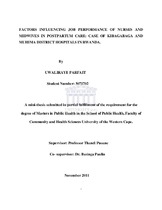| dc.description.abstract | Ensuring a good performance of health workers is one of the key components for provision of quality health care services in order to progress toward one of the priorities of MDGs namely improving maternal health care. In 2005, Rwanda adopted the “Performance Based Financing (PBF)” program to remunerate and motivate health professional based on their job performance. This lead to increase in the number of health workers by 62% between 2005 and 2008 and public subsidies for health worker remuneration tripled. Despite promotion of this motivation mechanism to enhance job performance in maternal health care, recent data in Rwanda show that MMR is still high with 383 per 100,000 live births and high rates of postpartum complications. All these problems have been attributed to poor performance of staff. To date, little research has been conducted on the factors that affect job performance among health care providers in low income countries and particularly in Rwanda. The present study assesses factors that influence job performance of health care providers working in postpartum care in two public hospitals of Rwanda. Ninety six nurses and midwives were observed providing early and late postpartum care and interviewed about the presence or absence of the performance factors within their work environment. Data were analyzed to determine if there is an association between observed providers performance and variables of interest. Observation revealed that staff performed poorly in the use of guidelines for the management in the postpartum care. The bivariate analysis showed that (a) receiving feedback about job performance (b) receiving training in postpartum care management, (c) training in the use of the tools for the daily work, (d) being satisfied with the way the work is organized, and (e) finding the organization interested in the staff creativity in general, are factors associated with good performance. In conclusion, the study identified important factors that need to be taken into consideration when planning strategies to improve the quality of care and reducing morbidity and mortality in the postpartum wards of the two hospitals. | en_US |

